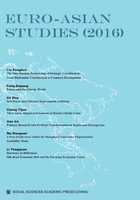
3. Conclusion
After the Fall of Communism in Eastern Europe in 1989, the announcement of the end of the Cold War by leaders from both the Soviet Union and the US at the Malta Summit in December 1989, and the collapse of the Soviet Union in 1991, the bipolar system formed after WWII was officially ended. The world then entered into a phase of transition between old and new patterns of global orders. Until today, the globe is still undergoing complicated changes, while the profound adjustment of international systems and global orders is still going on. Looking back on the vicissitudes in the international arena after the end of the Cold War, the collapse of the old global pattern and the establishment of the new world order are both closely connected with the situation of Eurasia, especially the transition and development of Russia.
The historical process of Russia's transformation and development is not only related to its attitude and measures over a series of fundamental problems including the nation's modernization, economic globalization and political democratization, but also closely connected to its ties with the outside world. After the dissolution of the Soviet Union, Moscow gradually enhanced its dependence on the rest of the world and increased its participation in international affairs. The influence of the external world on Russia has also been strengthened increasingly. The world changed Russia, and vice versa.
The Ukrainian crisis provided a good viewpoint to analyze the relationship between Russia and the outside world after the collapse of the Soviet Union and gave us a chance to thoroughly understand the Russian elite's international political views. It also offered an opportunity for us to profoundly study the relationship between Russia and the outside world and its impact on Russia's domestic politics. The characteristics of Moscow's connectivity and interactions with the outside world could be generally summarized as integration, equality and isolation. In fact, all of these phases are reflections of close ties between Russia and the world.
In the eyes of nations in the post-Soviet space, Russia is an empire. These countries were propelled to establish their own national identification on the path of de-Russification and get rid of Russia's control via approval of the Western political and cultural structures. But for Russia, the construction of both internal and external spheres lacks its own recognition as a modern state. It is closely related to Russian geographic space, historical culture, and realistic politics. About 20 years after the collapse of the Soviet Union, quite a few Russian political elite believe that Russia cannot find its place is the Western world. On the one hand, the West is the source of capital for modernization, on the other however, it is also a power of geopolitical challenge against Russia. Being both a role model and a challenge, the West has been seen as a hotbed for neo-isolationism in Russia. Although the Russian elite have not expressed their anti-US sentiments, such an emotion is in fact quite strong among them. In the meantime, their anti-EU mentality has also been growing.
Even so, the biggest threat for Russia to become isolated is from itself. If the country cannot develop a strategy to boost its economy and only establishes its development model on the basis of anti-Western sentiments, such isolation would only deteriorate the scenario. Russia may find its current mobilization effective in the short term, but will be bound to face fiercer response from the outside world. By then, its relationship with the West will end up in a deadlock. The temptation of mobilizing the state through anti-Western sentiments, which partly originated from radical nationalists and ultra-left conservatives, has been playing an important role in Russia's political ideology.
So far, the confrontation between Russia and the West is mainly caused by their strategic goals, international status, and traditional cultures. Putin noted clearly that the nation's foreign policy would not be adjusted during his State of the union address in 2014. It means that the soft confrontation between Russia and the West might last long. Then, is it possible for Russia to handle its domestic affairs well under the background of its sharp antagonism against the West? Nowadays, the revolution of information and technology has been rapidly changing the nature of economic development. Without integrating into the world economy, no country can achieve major economic progress. There is hardly any nation in today's world that can develop under a self-sufficient mode. Given the current export substitution strategy, how to attract foreign investment, technology, culture and management experience and how to deal with the relationship between economic recession and political stability have become Moscow's challenge on its path of realizing its strategic development target. A test for Putin will emerge during the seventh State Duma elections in 2016.
In short, Russia needs to re-establish its relationship with the outside world for its transformation and development after the collapse of the Soviet Union. The relationship between Moscow and the external world has mirrored a historical process of a broadening gap between the internal development and the external changes. Such a process and changes within Russia's domestic political order have influenced each other. Given the historical factors including the eastward expansion of NATO, the Bosnian War, the political environment and the first Chechen War, Russia failed to integrate into the Western system. Until today, the country still has yet to realize a balance between integrating into and enjoying an equal footing with the outside world.